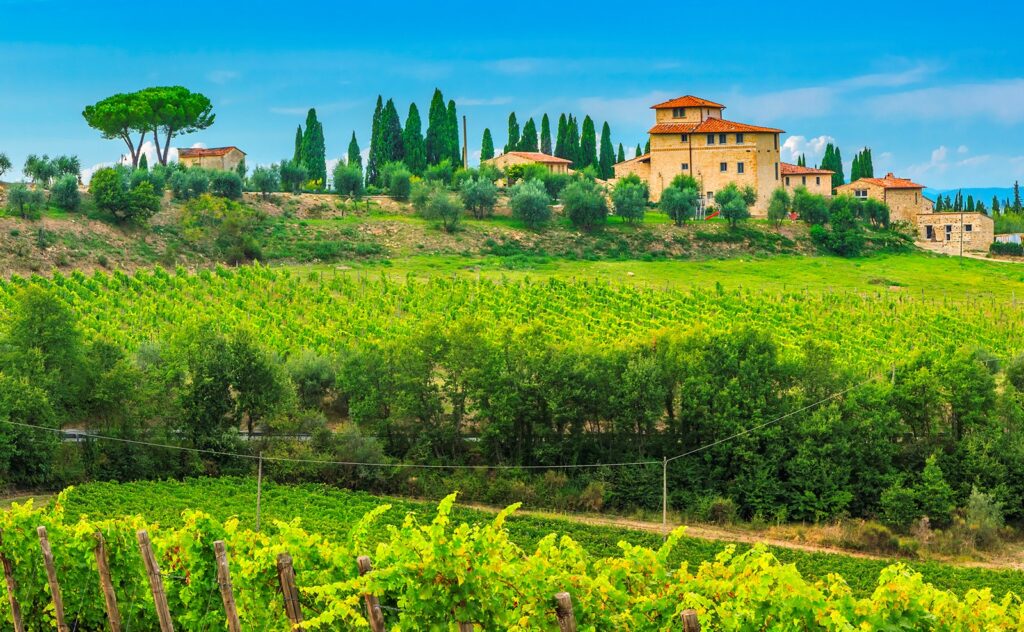Foreign investors planning to purchase a farmhouse with agricultural property in Italy (such as country houses with vineyards or olive trees) may avail themselves of a special regime offering significant tax advantages and financial benefits and incentives, both at the moment of purchasing the land and when running it thereafter.
In more specific terms, this constitutes the purchase of property through a particular type of limited liability company: the Italian agricultural limited liability company (“Società agricola a responsabilità limitata” or “SRL Agricola” hereinafter also “Agricultural LLC”).
Indeed, if the owning entity falls within this specific corporate form, there are a wide range of tax advantages and financial benefits offered by the Italian State (and by the local Region where the estate is located) to run and manage the business.
Therefore, when making an investment on farms or lands in Italy, it may be useful to determine whether the estate and the buyers are eligible to fulfil the requirements of an Agricultural LLC.
Many foreign investors have successfully opted for this choice by purchasing country houses surrounded by parcels of land. Take for example the bestselling Tuscan memoir ‘Under the Tuscan Sun’, a literary celebration of the voluptuousness of Italian life and of its properties. At large, the book recounts author Mayes’ experience of buying and renovating an abandoned old stone Tuscan villa and its surrounding parcels of olive groves and rolling hills.
In practical non-literary terms however, it is extremely important to attentively follow the rules and regulations concerning Agricultural LLCs in Italy when carrying out such an acquisition. These rules are very technical, and their violation may entail the risk of sanctions and fines by the Italian Revenue Office.
What are the main features of an Italian Srl?
Preliminarily, also foreign citizens may be shareholders and directors of an Italian SRL, provided that their country of origin offers conditions of reciprocity to Italian citizens. This preliminary check shall be made by an Italian attorney.
As to its functioning, the Agricultural LLC provides most of the advantages and features of ordinary LLC, namely:
- Minimum corporate capital of € 1 (although it is advisable a minimum of € 10.000);
- The company’s capital is divided into quotas, and its owners are known as ‘quotaholders’
- The quotaholders’ liability for the company’s obligations and debts is limited to the corporate capital conferred.
- There are several management options, such as the typical Board of Directors composed by a variable number of members, and the Sole Director.
- Decisions are adopted by way of a resolution, although the deed of incorporation or bylaws also provides that decisions may be taken upon consultation or in writing without holding a meeting.
- Depending on certain requirements, the SRL may have a sole auditor, a board of auditors or an external auditor.
What are the specific requirements to incorporate an Italian Agricultural LLC?
Italian law allows LLCs to take the status of “Agricultural LLC” provided that they meet the following three requirements:
- Exclusive exercise of “agricultural and related activities” set by the law;
- Mandatory indication of the word “Agricola” in the company’s name;
- Possession of professional qualifications: IAP
Exclusive exercise of agricultural and related activities:
According to Art. 2135 of the Italian Civil Code, the company’s corporate scope must consist of Agricultural Activities (cultivation of land, forestry, animal breeding) and Related Activities (Activities aimed at handling, preserving, processing, marketing and adding value to products obtained mainly from the cultivation of land or forests, or the rearing of animals; activities aimed at providing goods or services using primarily farming equipment or resources and other activities, e.g. management of agritourisms.)

Related activities aim to improve and support the agricultural undertaking, and thus necessarily take place alongside principal agricultural activities. These related activities must be carried out by the same company, and their income must not exceed a certain percentage of the company’s total revenue.
Mandatory indication of the work “Agricola” in the company’s name
According to Art. 2135 of the Italian Civil Code, the LLC must include the word ‘Agricola’ (i.e. Agricultural) in the company name (for example: Società Agricola Palm Beach a responsabilità limitata”).
Possession of Professional Qualifications IAP
At least one director of the LLC, if not a quotaholder, must hold the title of professional agricultural entrepreneur (“imprenditore agricolo professionale” or “IAP) or shall be a farmer (“coltivatore diretto”).
The knowledge and skills required to qualify as an “IAP” can be acquired by the successful completion of an examination (on-line courses are also available), which requires proficiency in the Italian language.
Furthermore, the IAP shall devote a certain percentage of their total working time to agricultural activity and derive a certain percentage of their income from agricultural activity.
It should be taken into consideration that a director can only confer his qualification of IAP to one company at a time, to prevent companies creating fictitious profiles in pursuit of the benefits associated with the ‘agricultural’ status.
Therefore, for foreign citizens intending to incorporate an Italian Agricultural Srl, there are two options:
- for those proficient in Italian, to take the IAP examination and hence to confer the qualification to the company, provided that they fulfil the other income and work requirements set out by the law;
- for those not proficient in Italian, to take arrangements with a local IAP who may be interested in joining the company as a director.
Main Benefits of Agricultural Srls
- Cadastral tax of 1% (compared to 9 % of registration tax)
- Access to multiple funds and financial incentives to carry out agricultural activities, especially in the case of organic agriculture.
Items to be checked when purchasing an agricultural land
a) The so- called “certification of urban destination” or “CDU”: official document issued by the Municipality where the land to be purchased is located, which specifies the urban destination of the land (for example: agricultural) and the presence of restrictions. It is a mandatory document to be annexed to the deed of sale.
b) The neighbors’ pre-emption right. The tenants of the agricultural land and the neighboring farmers are preferred in the purchase over the buyer. It is therefore mandatory to inform the neighbors in writing about the purchase proposal or the preliminary contract, including all the relevant main terms.
c) Inspections on the land.It is important to inspect the land before the purchase in order to ascertain, inter alia, the access points to the land (direct or via third-party headlands).
Risks
It is important to bear in mind that in order to keep the above-mentioned tax advantages, the agricultural property must be managed as provided by the law. Specifically, all tax benefits are forfeited and sanctions may be imposed if the owner transfers the land or ceases to cultivate or manage it directly before five years from the date of purchase, or if he uses the property for purposes other than those set out by the law. Thus, if portions of the property are bought for a different use, then they must be categorised under a different regime, so as to not risk said fines and sanctions.
Conclusion
When purchasing real estate in Italy which includes parcels of land, it is strongly advisable to seek legal advice to explore the possible option of incorporating an Agricultural SRL.
At PG Legal, we offer a wide range of consultancy services in this field, and we can assist you in selecting the best option to choose the most convenient corporate structure in order to successfully purchase and run an agricultural property.
